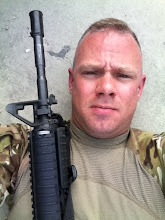That leads to the question, what can I use to keep me occupied over this time other than sleep, work, eat, and work out? Our camp has a limited MWR complete with gym, tiny theater, and small library for books and videos. There’s the USO that offers free telephone service back home and free low bandwidth Wi-Fi Internet for a limited number of users at one time. There’s a volley ball court in the back of the camp, and occasionally there are dances in the DFAC overflow tent where the tragically hip dance to the flavor of the week such as disco, hip hop, or country and western.
We do have one event out of the ordinary. On Sundays, the locals who have been cleared through background checks are allowed to come on the base and set up a bazaar in a secured area. A lot of the wares are standard Middle Eastern goods, such as rugs, tea sets, pirated software and movies, jewelry, carved wooden jewelry boxes, etc. Although with the size of my base I was extremely impressed with the amount and selection of the merchandise they brought. In fact, this was by far the best mobile bazaar I had ever seen set up. There were vendors selling precious gem stones, hand made/tailored suits, women's ethnic dresses, faux antique weapons, hand carved wooden furniture, paintings, books, cell phones, and a whole host of trinkets, knick-knacks, and souvenirs. I bought some Internet access cards for the commercial Internet access available in our barracks and considered buying a sim-card for a GSM phone I brought with me from home. I made my purchases in the required local Afghani currency, which exchanges about $500AF=$10US
If you don’t know anything about shopping in a bazaar or flea market, let me explain something first. You’re expected to bargain. If you don’t, you’ll be viewed as ignorant and naive. I ran into a woman who would look for what she wanted then have her friend come back later to bargain for a better price because she said she didn’t like confrontational situations. You should also know that you will be almost accosted by the owner at each stand you pass if they aren’t already engaged with a customer. What’s more, they all consider you their friend and offer you their “special price” as such. Some are not as pushy as others, but some go so far as to shake your hand and then while keeping it clasped pull you in to show you some item they want to persuade you into buying. My strategy was to tell each of them I was new, that I was there for a year, and that I would see them every Sunday, so I wasn’t interested in making purchases today.
The bazaar is a good place to shop for gifts that you’ll never find back in the
More to follow.





























